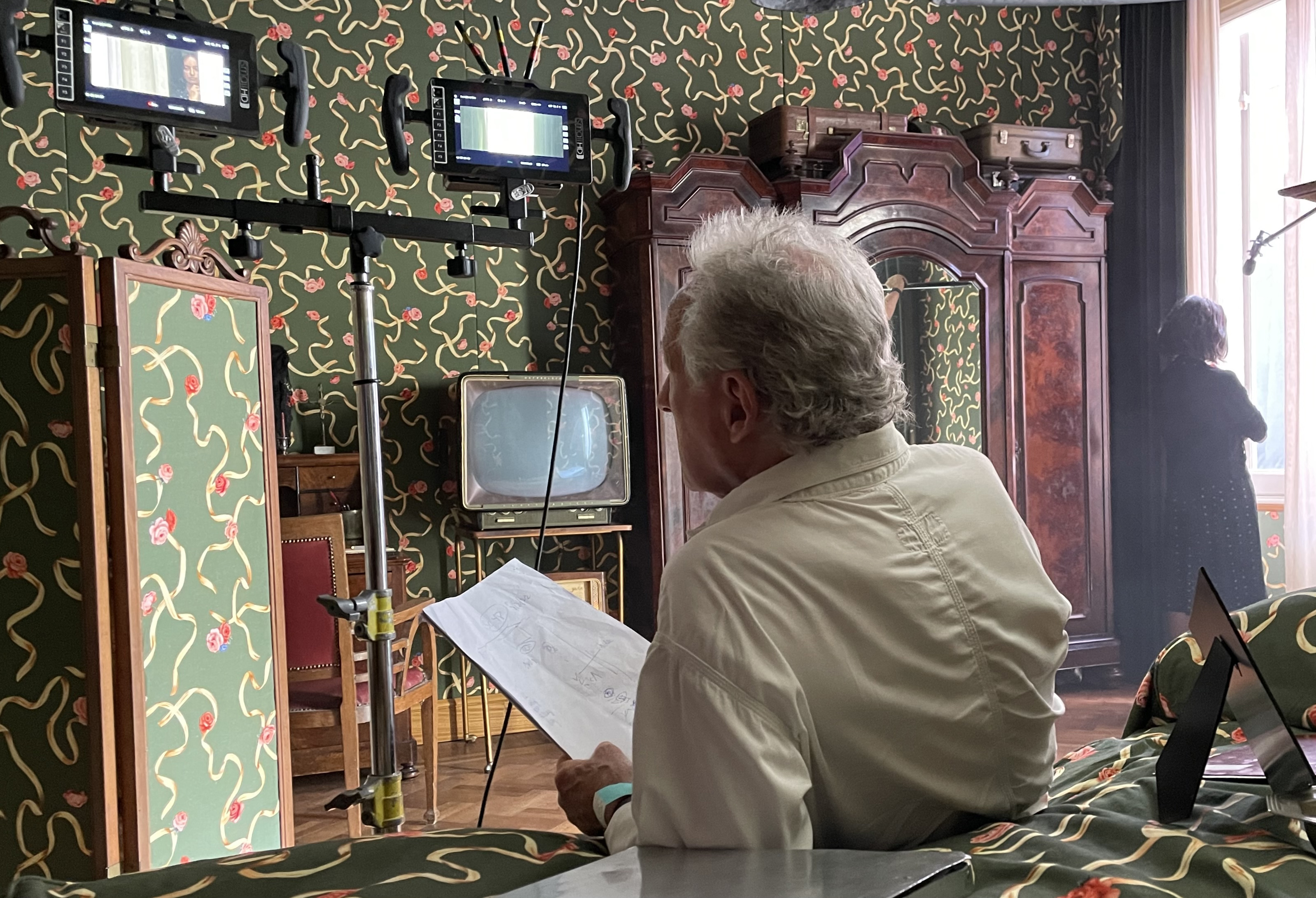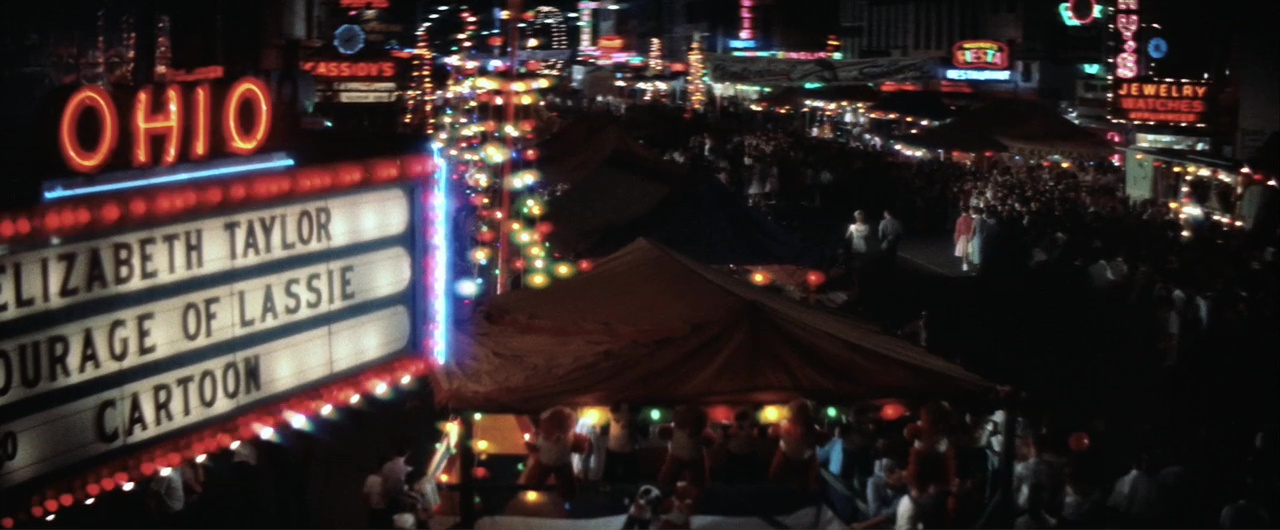John Cope wrote: ↑Sun Dec 31, 2023 4:28 am
Ferrari recalls a number of cinematic reference points, some, not surprisingly, Michael Mann's own, but stylistically it reminded me most of the great race car centric film
Le Mans, not just because of the subject but also because of an emphasis upon textured tone and ambient atmosphere that is predominant over narrative while drawing the pertinent narrative detail out and into the light. For Mann, this association is established right from the start with the events of his film situated explicitly in 1957 and thus providing a kind of snapshot portraiture of the figures involved rather than a more expansive and traditional biopic narrative. Within that framework details reveal a lot, both in terms of character (e.g. Ferrari's purposeful stride vs. his wife Laura's stunted gait) and Mann's distinctive aesthetic technique, his formal figuration (e.g. his unique approach to physicality with the camera right up on the back of the head in intimate intensity or with careful placement of figures at the edge of the frame or from an obscuring angle, all of which gets us to consider physicality differently and associate it with the contours of the cars depicted and to find meaning in that analogy). The film Ferrari then as conceived provides Mann with an opportunity for one of his characteristic concentrated studies, not so much upon the figures as characters but as deeply detailed mythic icons representative of a whole world and its implications.
The figure of Ferrari as the pole around which all else here revolves and whose philosophy or ideology radiates out to encompass all else around him is certainly a version of Mann's archetypal hero, a professional obsessively devoted to his work and who's personal rigor and insistent expectations make great demands upon others even while demonstrating an acknowledgment that he could not and would not live any other way. We see the effects of this in how it plays out in the domestic sphere with all the attendant tensions and how the prospect of a deal furthering his interests is enough to compel a libidinous encounter with his wife that almost acts as reconciliation or restoration of the brokenness between them. Mann's portrait of Ferrari is actually similar to Nolan's portrait of Oppenheimer, both brilliant and driven to a fault and flawed in ways related to what lies outside their immediate and specialized purview but which also may be endemic of it. If Ferrari, for instance, seems to lack sympathy at times for the literal human carnage around him, it is because he simply cannot and will not allow it to distract or detract from a relentless focus; it's not so much that he's incapable of being reached as it is that he cannot afford to allow himself to be reached. In this way, and as with Oppenheimer, his fixations go beyond mere ego satisfaction; he tells his drivers that it is not about the team but about winning and that win, that goal reached, translates finally to the abstract perfectionism of the theoretician (especially as he is no longer a driver himself), which finds a correspondence in Mann's geometric precision. But that should have been obvious right away; Ferrari states at one point that he sells cars in order to race them and not the other way around.
This perfection, finally, is what the figure of Ferrari and the film is all about. The drive for it links him not just to other Mann characters but Mann himself so that the refinement of technique becomes a paramount essential. And thus it shifts into both an esoteric realm and one expressly related to the divine (an early church service scene makes that point). Mann connects spaces of the explicitly mythic (the church, the opera, the race track) and the stakes are certainly and quite literally life and death, implying their existential and metaphysical significance. The drivers may be willing to take on their challenges almost as soldiers in the form of war movie motifs but by the end we recognize the marginality of their committed pursuit. As Ferrari notes, they may all understand how close death is but children don't, families don't. The cost of their accomplishment is not always just upon them.
Truly a wonderful comment on the film, which I resisted reading until seeing the film myself. I wish I could be in agreement though - my experience was vastly different than yours.
For me personally, the film was not just the disappointment of the year but one of the stronger disappointments of the last couple of years - the main reason being the obvious fact that we’re not so fortunate any more to get a new Michael Mann film every other year. Furthermore, Mann is a champion of a kind of cinema we don’t get to see at all on this scale. It’s a very unique POV that started with his digital efforts that blurs the line between classic theatrical staging vs. something filmed live. As you mentioned, John, Mann’s camera moves in such a particular way that it often starts in a “classical” position, thereby composing an image and then immediately moving towards breaking the frame, pushing in and collapsing the fixed nature of where it started out. It’s as if Mann has the urgent need to explore the truth of each image as soon as he brings it to life - questioning its nature, its “content” and its place in the collection of the many images that make up a film. It’s a point of view full of life, energy and integrity. Particularly “Public Enemies” is a spectacular triumph of merging that “style” with its subject. In that film, Mann’s camera is on eye level with John Dillinger, literally over the shoulder, as if fully taking part in the events as they happen. Seldom did the large-scale reenactment of a past feel this vital, alive and immediate in the context of how the camera interacts with the world when looking at 21st century mainstream cinema. It’s obvious that this approach alienated most audiences and critics with a firm understanding of how classical cinema is supposed to look and sound like and the way scenes should be covered and edited.
After finishing the film, I asked myself whether “Ferrari” wasn’t nearly as controversially received fifteen years after the former film? For one, the works of Michael Mann have been extensively re-evaluated and newly appreciated by critics and audiences alike, making up for what some of them misunderstood or frankly didn’t see at the time of the films’ original release. And secondly, with cinema and the consumption of moving images having evolved so much in the meantime, Mann’s “style”, a particularly active and lively way of capturing and interacting, isn’t considered too “revolutionary” any more - as literally any way of filming - due to the Pandora’s box having been opened and the possibilities to create and share encompassing literally endless ways to do what was once exclusively reserved to traditional filmmakers. Originality and exclusivity once reserved for an elite group of artists - democratized and globalized. In other words, like those of many other directors, Mann’s style is not revolutionary any more and the cinema screen isn’t the only way to access it if desired.
This drastic change of availability however does not change our ability to interact with Mann’s work just like we did (or didn’t) before on a purely emotional, immersive and personal way, simply stripped of the sensation of it being new and never seen. As such, the few voices about improper editing, sound mixing, directing etc. have all but disappeared as quickly as they went into the world.
The strong focus on that is particularly unfortunate here because these qualms are rather superficial and only at the tail end of the inherent problem the film has (unlike “Public Enemies”). The central problem is that Mann didn’t manage to tailor the world of Ferrari to his way of looking at it or, shouldn’t we rather say that the world of Ferrari would have been perfectly compatible with Mann had he not misjudged his entry point?
It all starts with the visuals. Mann’s images are still digital but in 2023, gone are the murky, noisy, mushy images that went hand in hand with his vivid approach to capturing his actors. The lack of detail therein only enhanced what he aspired to on the compositional plane - in the end creating a staggering, multilayered effect. Now, with cameras having improved and “perfect” digital images being possible when- and wherever they’re used, this particular heightening is gone and in retrospect definitely linked to the early 2000s.
Unlike Mann’s colleagues, he continued to film without adding any sorts of artifacts to his digital capture - meaning he’s still clearly comfortable embracing its virtues and differences compared to analogue film.
All of this would have been valid and likely made for an interesting experience had the film looked and felt vastly different. Erik Messerschmidt’s images are unfortunately incompatible in the context of Mann’s approach (and plain ugly in general). Whereas we could feel every nuance in Mann’s dark and mushy digital images in “Collateral” and “Miami Vice”, we can’t see anything even in broad daylight in “Ferrari”. It’s as if we’re looking at the entire film through sunglasses day and night. This deprives us of the most basic sense of immersing into the images and the world of “Ferrari”. Secondly, Mann and Messerschmidt made the grave error to attempt at modeling their images after Caravaggio (the comparison is an insult). This is a choice antithetical to Mann’s “live cinema”, which is all about shaping and preserving something as close to actual, documentary cinematic reality as possible. Caravaggio is static, densely layered and composed. Refined, changed and refined again for the perfect image. Mann was not about that in his digital era and is still not if we look at his stylistic tendencies in “Ferrari”. This is a central issue as Mann and his DP deprive us of this most vital way of experiencing and understanding what the man in the title is about.
The slightly lesser, but still big problem are the actors, which feel miscast across the board. From the visibly uncomfortable Adam Driver to a clueless and incompatible Shailene Woodley to faceless and borderline non-existent supporting characters. It’s no homogenous, tailored world we see on screen, instead fully scattershot and fragmented but not in an artistic, reflective way. (FWIW, I consider “Oppenheimer” what “Ferrari” should have been). For the very first time, Michael Mann’s camera hovers around his characters’ faces, brings them alive in 3D but we’re left banging at an invisible border that keeps us outside their souls, obsessions, dreams and desires when we so desperately want to get ahold of what’s going on there.
“Ferrari” is a deeply uncomfortable and frustrating viewing experience, impossibly hard to get into and very unfortunate when considering how it got made and what a passion project it was for its director.


